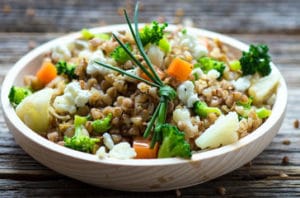“The produce manager is more important to my children’s health than the pediatrician.” ~Meryl Streep
 Food is your health’s most powerful ally, or its most insidious enemy. If you’re confused about how to eat healthfully, you are not alone. Information about food and nutrition is often conflicting and constantly changing. Clever marketing by the food industry obscures the difference between healthy and toxic eating, convincing us we need products that do the very opposite of what we’re told they do. Dairy, for example, does not strengthen your bones. It actually leeches calcium from your body, according to a Harvard 12-year study of 78,000 women.
Food is your health’s most powerful ally, or its most insidious enemy. If you’re confused about how to eat healthfully, you are not alone. Information about food and nutrition is often conflicting and constantly changing. Clever marketing by the food industry obscures the difference between healthy and toxic eating, convincing us we need products that do the very opposite of what we’re told they do. Dairy, for example, does not strengthen your bones. It actually leeches calcium from your body, according to a Harvard 12-year study of 78,000 women.
Other studies corroborate Harvard’s findings: Older adults who eat dairy products are more prone to osteoporosis and suffer greater numbers of bone fractures than those who don’t.
According to the Mayo Clinic, a whole foods, plant-based diet, focusing on beans, legumes, vegetables, fruits, and whole grains, offers health benefits. Plant-based foods are nutrient rich, contain fiber, and are generally less fatty and caloric than animal foods (meat, eggs, and dairy). People who eat only plant-based foods—vegetarians—generally weigh less and have lower risk of some diseases, including heart disease and cancer, than non-vegetarians.
Here are some other benefits of adopting a plant-based diet:
- Plant-based foods, generally, are less expensive than animal products. You may be able to save money by going vegetarian, or simply replacing several meat-based meals a week with plant-based proteins.
- Many animal products, including beef, chicken, pork, lamb, milk and other dairy items, and eggs contain hormones, antibiotics, and other toxic chemicals. Vegetarian proteins lower your risk for consuming toxins.
- Plant-based foods may be helpful in maintaining a healthy weight.
- Vegetables and whole grains are chock full of nutrients that help keep your eyes, skin, heart, and brain healthy.
- Plant-based foods contain no cholesterol.
If you are considering making the move towards a more plant-based diet, here are some guidelines for getting the protein, calcium, B vitamins, and other nutrients you need:
- Protein. Include lentils, tempeh (fermented tofu that has a slightly nutty taste), tofu, edamame, beans, hemp seeds, and almonds in your diet. 8 ounces of beans and legumes, 4 ounces of soy products, and 3 ounces of nuts and seeds equal as much protein as a typical serving of meat.
- Grains. Eat whole grains—quinoa, brown rice, millet, and amaranth—that are high in fiber and protein. Quinoa is also a good source of calcium.
- Iron. Lentils, soy foods, dried prunes, and apricots are rich in iron.
- Calcium. Choose soy products, almonds, dark green leafy vegetables (spinach, collard greens, and bok choy).
- B-12. When you switch to a plant-based diet, you must make an effort to get the recommended B-12 requirement. Nutritional yeast, available in health food stores and many supermarkets, and some mushrooms contain B-12. Ask your health care provider if a B-complex or B-12 supplement is appropriate for you.
- Omega-3 Fatty Acids. Opt for walnuts, ground flax seeds, hemp seeds, chia seeds, seaweeds, and kelp.
Other things to consider:
- Combining beans and legume with brown rice creates a complete protein that contains all necessary amino acids.
- Soy, quinoa, and hemp seeds are complete proteins.
- Manage portions of seeds, nuts, and nut butters, which relatively high calorie. Eat no more than 3 ounces a day, unless your health care provider instructs otherwise.
- Avoid processed and packaged foods. Always opt for whole foods whenever possible.
About Me
After more than 40 years of chronic sinus and upper respiratory infections, allergies, colds, and constipation, I eliminated all animal products, including eggs, dairy, and fish, from my diet. I would have preferred to give up a kidney rather than my lattes and Greek yoghurt (the last animal products in my diet), but I’d tried every conventional and alternative therapy imaginable—antibiotics, probiotics, daily wheat grass shots, oil of oregano, aloe vera juice, naturopathic doctors and formulae, homeopathic doctors and formulae, yoga, somatic therapy, positive thinking, affirmations, vitamin C and zinc, echinacea and other herbs, hydrotherapy, hypnotherapy, Chinese medicine, Ayurveda, and immune system boosting meditations. None worked.
I have not had a single sinus or upper respiratory infection since giving up dairy.
Warning: In the first few weeks of life without dairy, I lost a lot of weight. I had to readjust my food plan and up my calories to offset the dramatic weight loss.
I have been a wellness consultant and health writer for MetLife for 25 years. I am a health and fitness coach.


